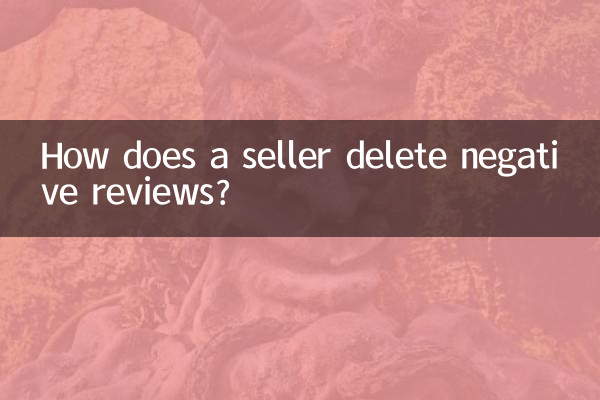How do sellers delete negative reviews? Revealing industry insider secrets and coping strategies
On e-commerce platforms, the impact of negative reviews on sellers cannot be ignored. Recently, the topic of "sellers deleting negative reviews" has once again become the focus of heated discussion. This article will combine the hot topics on the Internet in the past 10 days to analyze the common methods used by sellers to delete negative reviews, platform rules, and consumer response strategies.
1. Inventory of hot topics in the past 10 days

| Ranking | hot topics | Discussion popularity | Related keywords |
|---|---|---|---|
| 1 | Sellers spend money to delete bad reviews | 95,000+ | Negative review, deletion, intermediary |
| 2 | How does the platform identify fake reviews? | 78,000+ | algorithm, identification, falsehood |
| 3 | How consumers protect their right to review | 65,000+ | Rights protection, complaints, platform |
2. Common methods used by sellers to delete negative reviews
1.Negotiate a refund or compensation: The seller contacts the buyer privately and offers a refund or additional compensation in exchange for the buyer deleting the negative review.
2.Exploit platform vulnerabilities: Some sellers use batch reporting, malicious complaints, etc. to take advantage of loopholes in platform rules to force the system to automatically delete reviews.
3.Employment agency services: There are professional "negative review deletion" intermediaries on the market, claiming to help sellers delete negative reviews through internal relationships or technical means.
| Type of means | success rate | risk level |
|---|---|---|
| Negotiate a refund | 60-70% | low |
| Exploit vulnerabilities | 30-40% | high |
| employment agency | 50-60% | extremely high |
3. Platform rules and penalties
All major e-commerce platforms have strict regulations on deleting negative reviews. Taking Taobao as an example, the platform clearly prohibits sellers from deleting reviews through improper means. Violators will face the following penalties:
-Point deduction penalty: 12 points will be deducted for each violation, and the store will be closed if the accumulated points reach 48 points.
-Downgrade processing: Product search rankings have dropped, affecting traffic and sales.
-Funds frozen: Serious violations may result in account funds being frozen.
4. How do consumers protect their right to evaluation?
1.Keep evidence: Take a screenshot to save the content of the negative review and the seller’s communication record as a proof of rights protection.
2.refuse inducement: Don’t delete real reviews for small favors and encourage bad habits.
3.Platform complaints: When encountering malicious harassment or threats, report it to the platform customer service immediately.
5. Industry Trends and Suggestions
Recent data shows that the platform’s algorithm has been continuously upgraded, and the accuracy of identifying false reviews has increased to more than 85%. It is recommended that sellers focus on product and service quality rather than opportunism. At the same time, consumers should also evaluate rationally and jointly maintain a healthy e-commerce environment.
It can be seen from the above analysis thatSeller deletes negative reviewAlthough it is a pain point in the industry, with the strengthening of platform supervision and the improvement of consumer awareness, this phenomenon is gradually being contained. Both buyers and sellers should abide by the rules and build an honest trading environment.

check the details

check the details